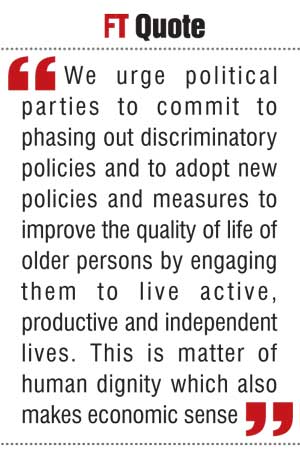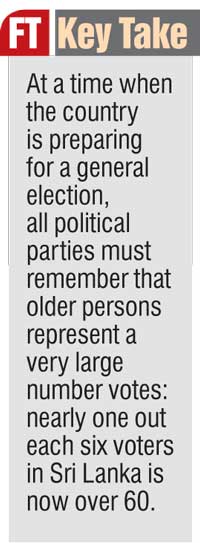Wednesday Feb 25, 2026
Wednesday Feb 25, 2026
Friday, 10 July 2015 00:00 - - {{hitsCtrl.values.hits}}
By Annie Kurian
The national census in 2012 counted 2,520,573 persons who were over 60 years, which was of 12.4% of the total population. Of these older persons, 56% were women.
When the census was taken, more than three quarters of the older persons (78%) were aged between 60 and 74 years. This means most are still active and potentially productive. 
However, the census also found that only 25.6% are economically engaged, and 55% of those who are productive are self-employed. Unfortunately, the significant contribution made by a large number of women over 60 years who are engaged in unpaid household work is not counted as ‘productive work’.
At a time when the country is preparing for a general election, all political parties must remember that older persons represent a very large number votes: nearly one out each six voters in Sri Lanka is now over 60.
As such, political debates and election manifestos need to address the particular needs of this important demographic group.
For too long, older persons have been depicted by the media and others as a ‘dependent’ group. It is true that advancing age is accompanied by some vulnerabilities but categorising all older persons as ‘unproductive’ or ‘dependent’ is inaccurate and misleading. Both the state and private sector entities need to change this mindset to tap the full potential of an ageing population.
Sri Lanka does have an excellent written charter and policies on ageing and older persons, but lacks a mechanism for their proper implementation. Older persons’ concerns are relegated to the Ministry of Social Welfare, and to a smaller extent, the Ministry of Health. This indicates that older people are seen purely as a ‘welfare issue’.
In contrast, many other countries are using different policy options and models to keep their ageing populations active, productive and independent. We need to learn from these experiences, and fast.
We therefore urge political parties to commit to phasing out discriminatory policies and to adopt new policies and measures to improve the quality of life of older persons by engaging them to live active, productive and independent lives. This is matter of human dignity which also makes economic sense.
The following key suggestions have emerged from many stakeholder consultations we have had during the past few months:
The percentage of those over 60 is set to grow as Sri Lanka’s population ages. By 2030, around 20% of Lankans – or one out of every five – will be over 60. Our society as a whole has a limited window in which to prepare for this inevitable demographic transition.
Right attitudes, policies and practices by everyone can ensure healthy and productive ageing. Political commitment is vital to make this happen.
[Annie Kurian is Director, Centre for Social Concerns. She holds a Master degree in Social Work and counts many years of experience in both development and humanitarian work. She was the Sri Lanka Country Director for Kinder not Hilfe, a German-based organisation. She served as Training Adviser at the Asia Training Centre on Ageing (ATCOA) of HelpAge International based Chiang Mai, Thailand, and was Training Team Leader in Humanitarian Practice Training under RedR UK for South Sudan and Kenya.]